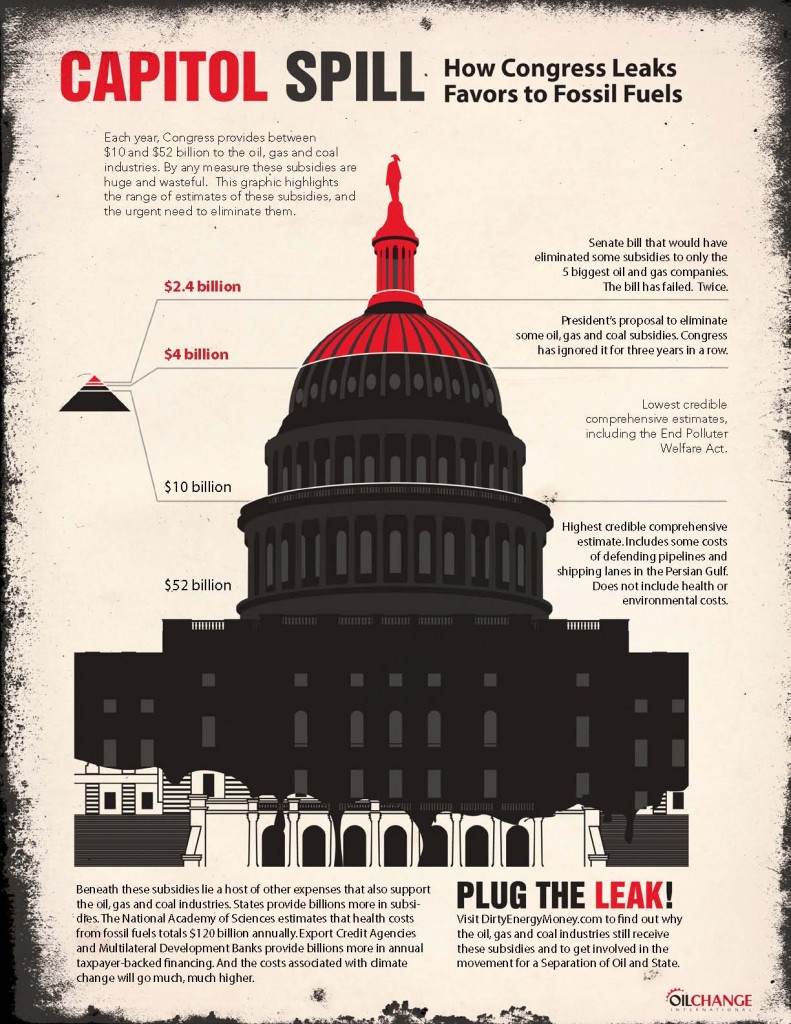Graeme wrote: Much of that comes not as direct handouts but instead via loopholes in the tax code; deductions for depleting oil reserves, for example, and write-offs for the expense of drilling a new well.
Just to give readers some more info on the tax deductions because most people have no idea what they really are.
What are IDCs?Quite simply, Intangible Drilling Costs (IDCs) represent all expenses an operator may incur at the wellsite that don’t – by themselves – produce a physical asset for the producer. In the oil and natural gas business, those costs include things like labor and site preparation, renting drilling rigs – costs that have no salvage value after they are spent.
The standard IDC tax deduction – which has been around in one form or another for 100 years — allows producers to recover those investment costs quickly and reinvest them in exploring for, and hopefully producing, new American oil and natural gas supplies. Since 1913, IDCs have allowed producers to invest literally hundreds of billions of dollars in finding and delivering new energy that might not have been available without them. For America’s 7,000-plus independent oil and natural gas producers (who drill more than 90 percent of the nation’s wells), IDCs can be deducted in the year they are spent or spread over 60 months. Independent producers are in the business of exploring for and producing oil and natural gas. The integrated companies (who have marketing or retail operations like gasoline stations) must amortize 30 percent of IDCs over 60 months and can deduct the remaining 70 percent in the year they are spent or spread them over 60 months.
Drilling a well does not guarantee resource production; the IDCs deduction enables America’s independent oil and gas producers to continue exploring even when a well is unsuccessful and reinvesting production revenues when they are. Independent producers reinvest as much as 150 percent of their US cash flow in new US projects. This investment and reinvestment in America’s vibrant oil and natural gas production sector supports the small businesses and the countless other industries and consumers who benefit from affordable, secure American energy.
Do Other Industries Get IDCs?The terminology might be different, but IDCs are just like tax deductions available to many American industries – to farmers for fertilizer and to technology companies for research and development. Even bakeries have deductible costs. Their supplies—sugar, flour, eggs—are all tax deductible raw materials, along with labor costs. No matter the industry, these are all upfront costs facing nearly every American small business owner with no guaranteed return on investment. In fact, IDCs are no different than costs that are immediately deductible under the general tax law that applies to all business losses – vital deductions, not government handouts, that help American businesses.
Why Are IDCs Important For America?IDCs were put in place to reflect the deduction of expenses specifically for oil and natural gas production – and that’s just what they do. Removing this 100-year-old tax provision from the code would not only strip away roughly 25 percent of the capital available for independent producers to continue looking for new oil and natural gas, but also diminish the many economic benefits created by those activities. Independent producers support over 4 million direct, indirect, and induced jobs – in the lower 48 states alone – while providing billions in revenue and taxes. In 2010 alone, onshore upstream taxes amounted to $67.7 billion.
What is Percentage Depletion?The percentage depletion deduction has been a part of the U.S. tax code since 1926. Depletion is a form of depreciation for mineral resources that allows for a deduction from taxable income to reflect the declining production of reserves over time.
For oil and natural gas producers, percentage depletion is a small producer issue. Percentage depletion is only allowed for independent producers and royalty owners. It is calculated by applying a 15 percent reduction to the taxable gross income of a productive well’s property. The reduction is determined on a property-by property basis and is limited to the taxpayer’s first 1,000 barrels of oil (or 6,000 mcf of natural gas) of production per day. It is also capped at the net income of a well and limited to 65 percent of the taxpayer’s net income. Because of these restrictions, only small independent producers and royalty owners are users of the percentage depletion deduction.
However, believe it or not, our nation’s smallest wells collectively make up a significant portion of America’s oil and natural gas production. On average, these wells produce less than 15 barrels of oil per day, yet account for nearly 19 percent of U.S. oil production and less than 90 thousand cubic feet per day, yet account for 12 percent of U.S. natural gas. Percentage depletion enables smaller operations to recover some of the high costs associated with keeping these marginal wells up and running.
Why is Percentage Depletion Important?The percentage depletion deduction is not a credit; it’s not a subsidy; it’s most certainly not a handout. This deduction is a standard part of the American tax code that supports the development of U.S. oil and natural gas—and an array of other mineral resources—that would otherwise be uneconomic to produce.
This provision also enables independent producers—businesses with an average of 12 employees—to retain revenues that are vital to future investment and operation of America’s oil and natural gas wells. Thanks to percentage depletion, these operators are able to retain their earnings and many are reinvesting 150 percent of their cash flow back into American energy development, strengthening our nation’s energy future while employing thousands of men and women across the nation. Royalty owners – men, women and children who live in all 50 U.S. states – also rely on this important tax provision and the value it confers upon the resources they own.
The International Energy Agency has projected that the U.S. could be the world’s largest oil producing country by 2020, providing valuable energy and national security benefits for the nation. Loss of percentage depletion would place marginal well production in jeopardy – threatening American energy development, federal and state revenues, and thousands of good-paying American jobs.
Why Can Percentage Depletion Exceed the Cost of the Well?The short answer is: Congress wanted it that way. Before the percentage depletion deduction was created, only a deduction called “cost depletion” was allowed for mineral resources. Congress discovered that American mineral resources – including oil and natural gas – were being shut down and lost forever if only cost depletion was available. Congress created the concept of “value depletion” that ultimately took the form of percentage depletion. It led to robust development of American minerals and remains a key factor for many mineral development projects. For oil and natural gas production – despite all of the constraints and limitations – percentage depletion plays its significant role in keeping America’s marginal wells producing.
Why is the Passive Loss Exception an Issue?The passive loss exception enables working interest owners in oil and natural gas production to achieve some parity between their investments and those of corporate shareholders. By counting any working interest investment losses as active instead of passive, investors are able to treat the normal business deductions from their investment in the same way that a corporation would. But the Obama Administration would repeal the passive loss exception.
Why was the Passive Loss Exception Created?The passive loss exception reflects Congressional recognition that the Tax Reform Act of 1986 created an inequity. The Tax Reform Act divided investment income/loss into two baskets – active and passive. Moreover, the passive loss rules apply only to individuals; corporations pass the same deductions to shareholders as part of the overall value of the stock. If income/loss, arising from natural gas and oil working interests, were treated as passive income/loss, taxpayers would be significantly less willing to risk an investment in natural gas and oil development.
Most American wells today are drilled by small and independent companies, many of which depend on individual investors. There is no sound reason for Congress to enact tax rules that would discourage individual investors from continuing to participate in energy investments. The repeal of the working interest rule, therefore, would senselessly drive natural gas and oil investments away from individuals and toward corporations.
What is Active Versus Passive?Passive income and loss are based on an activity in which the investor is not “materially” involved. According to the IRS, material involvement is on a “regular, continuous, and substantial” basis. For example, if an investor buys shares in a rental property – in which he or she is not actively involved in operating or maintaining – the investment is considered passive. This is the same for limited partnerships – a limited partner invests in the partnership but is not involved in the day to day activity and operations.
Limited partners are vital to the investment in oil and natural gas, spurring investment in American energy. Unfortunately, drilling a well does not guarantee resource production; yet the capital costs of exploration – successful or not – are extremely high. Because of the passive loss exception, working interests in oil and natural gas are removed from the passive income basket. In other words, all oil and gas working interests are considered active, even if the investor is not the operator of the drilling and production operations.
Importantly, investors in working interests are engaged in the very real activity of exploring for and developing oil and natural gas resources. Moreover, these investors are allowed deductions only for the actual expenses incurred and paid by them with respect their working interests. Working interest owners cannot deduct any expenses that have not actually been incurred by them and for which they are not entirely liable. By defining this income/loss as active, these investors and partners are able to continue advancing American energy exploration and production.
Why is Passive Loss Exception Important to American Energy?The passive loss exception enables continued investment into American energy exploration, supporting the small businesses and the countless other industries and consumers who benefit from affordable, secure American energy. By allowing individual investors to participate actively in oil and natural gas production ventures, investment is able to continue where it would otherwise be lost.











